Resolution 3 – Time to act: Tackling epidemics and pandemics together
Summary
Resolution 3 “Time to act: Tackling epidemics and pandemics together” aims to support the components of the International Red Cross and Red Crescent Movement (Movement) in implementing a structured, comprehensive, predictable and coordinated approach to epidemic prevention, detection, response and recovery in close cooperation with States and other partners. It embodies an acknowledgment of the risk posed by disease outbreaks and is a significant step forward in reaching sustained progress towards improved capacity.
The outbreak of COVID-19 has, more than ever, demonstrated the importance of such a resolution and serves as a stark reminder of the threat to humanity posed by emerging communicable diseases. Other outbreaks such as Ebola and the pandemics of H1N1 and H5N1 influenza and other severe acute respiratory syndromes (SARS) also underline very specific needs. Epidemics are often a symptom of underlying weaknesses in the health system and of poverty and inequity. They cause illness and death but can also impact the stability and economy of affected communities. The overarching direction of improved epidemic response is, therefore, grounded in strengthening resilience and building capacity at all levels, including in communities, National Societies and governments and within the humanitarian architecture. The Movement has a long and extensive history in the prevention and control of epidemics. Every year, National Societies around the globe are involved in mobilizing communities, caring for the sick and protecting the vulnerable from a wide variety of infectious agents.
This resolution is deliberately focused on activities and actions where the Movement creates added value to existing capacities and therefore has a strong emphasis on community approaches and localized responses. The resolution facilitates the development of a common vision, approach and commitment to working together within countries and across borders to ensure maximum impact of all epidemic control investments and successful detection, control and response activities, ultimately saving lives and building health resilience with and in the most vulnerable communities.
Some of the actions to be taken following the 33rd International Conference
By States
By the Movement
By States and Movement components
The outbreak of COVID-19 has, more than ever, demonstrated the importance of such a resolution and serves as a stark reminder of the threat to humanity posed by emerging communicable diseases. Other outbreaks such as Ebola and the pandemics of H1N1 and H5N1 influenza and other severe acute respiratory syndromes (SARS) also underline very specific needs. Epidemics are often a symptom of underlying weaknesses in the health system and of poverty and inequity. They cause illness and death but can also impact the stability and economy of affected communities. The overarching direction of improved epidemic response is, therefore, grounded in strengthening resilience and building capacity at all levels, including in communities, National Societies and governments and within the humanitarian architecture. The Movement has a long and extensive history in the prevention and control of epidemics. Every year, National Societies around the globe are involved in mobilizing communities, caring for the sick and protecting the vulnerable from a wide variety of infectious agents.
This resolution is deliberately focused on activities and actions where the Movement creates added value to existing capacities and therefore has a strong emphasis on community approaches and localized responses. The resolution facilitates the development of a common vision, approach and commitment to working together within countries and across borders to ensure maximum impact of all epidemic control investments and successful detection, control and response activities, ultimately saving lives and building health resilience with and in the most vulnerable communities.
Some of the actions to be taken following the 33rd International Conference
By States
- Facilitate the contribution of the Movement’s components to ensuring a predictable and coordinated approach to epidemics and pandemics
- Include National Societies in disease prevention and control and multisectoral preparedness and response frameworks and provide funding support
By the Movement
- Work with public authorities to deliver an efficient and expedited public health response for affected populations during crises, including building early warning and rapid response capacity in hard-to-reach, underserved and high-risk communities
By States and Movement components
- Actively engage with communities on outbreak prevention, preparedness and response
- Develop innovative tools (i.e. data and technology), guidance and strategies to strengthen response capacities and quality
- Ensure the health and safety of volunteers and staff responding to epidemics/pandemics, including mental health and psychosocial well-being
Adopted resolution at the 33rd International Conference
-
Resolution 3 – Time to act: Tackling epidemics and pandemics together
- Adopted resolution (33IC/19/R3)
- Background document (33IC/19/12.3)
Reporting on resolution
Share your progress and implementation highlights here!
Related documents
-
Documents
- Statutory Meetings blog article: The story of a resolution in the time of COVID-19
- The World Health Organization (WHO) International Health Regulations (2005) (IHR)
- To view all statements, publications and promotional materials related to epidemic and pandemic preparedness, please go to the IFRC epidemic and pandemic preparedness resource library.
- The IFRC-wide COVID-19 Appeal
- To view all resources on the response to the COVID-19 outbreak, please visit the IFRC COVID-19 Resource Compendium
Related pledges
Reporting on pledges related to this resolution
Want to learn more?
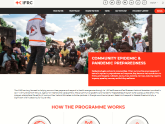 Community epidemic and pandemic preparedness page on the IFRC website
Community epidemic and pandemic preparedness page on the IFRC website 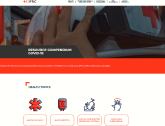 IFRC COVID-19 Resource Compendium
IFRC COVID-19 Resource Compendium 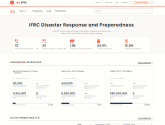 IFRC GO platform for all appeals and responses relating to global COVID-19 operations
IFRC GO platform for all appeals and responses relating to global COVID-19 operations 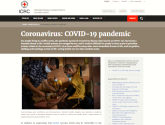 COVID-19 page on the ICRC website
COVID-19 page on the ICRC website 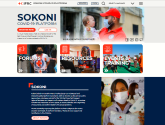 IFRC SOKONI – discussion forums on COVID-19 for Red Cross Red Crescent volunteers and staff
IFRC SOKONI – discussion forums on COVID-19 for Red Cross Red Crescent volunteers and staff  IFRC Solferino Academy: Mapping COVID-19 Red Cross Red Crescent volunteers’ experience and insights
IFRC Solferino Academy: Mapping COVID-19 Red Cross Red Crescent volunteers’ experience and insights




